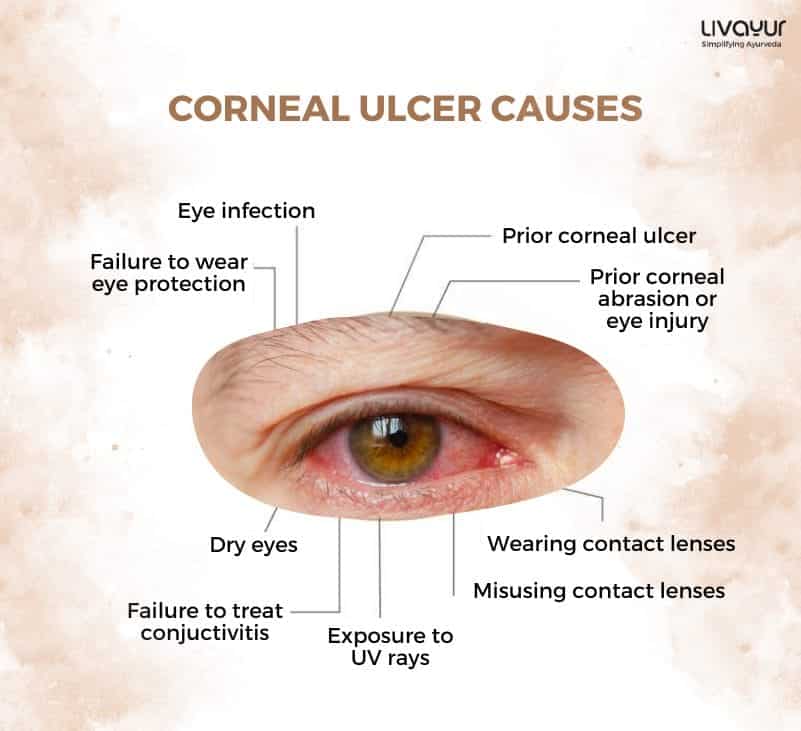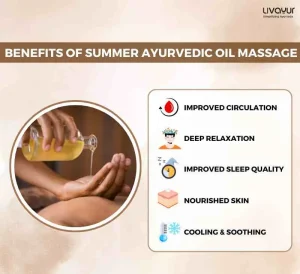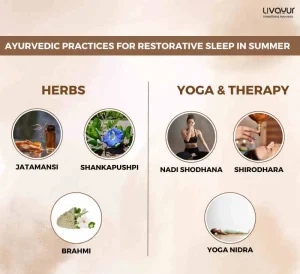This article is reviewed by an expert
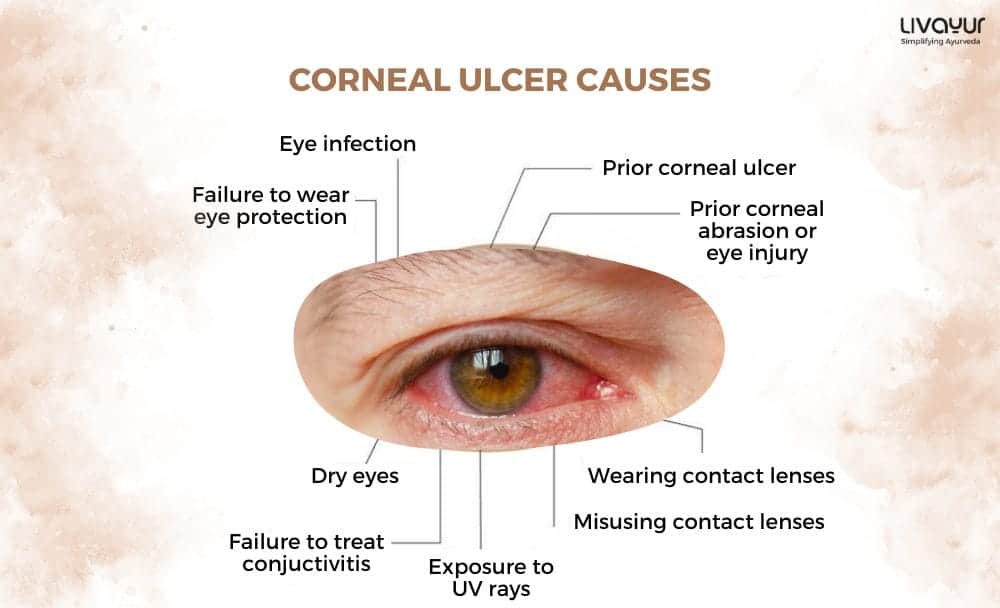
Are you experiencing redness, intense pain, or blurred vision in your eyes? These could be symptoms of a corneal ulcer.
In this blog, let’s dive deep into corneal ulcers, exploring modern treatments and even the holistic perspective of Ayurveda. Let’s learn how to protect your vision and treat corneal ulcers.
What Is Corneal Ulcer (1)?
A corneal ulcer, also referred to as keratitis, is an open sore that develops on the cornea. The cornea acts as a protective layer, covering the iris and pupil, similar to how a watch crystal shields the face of a watch.
Symptoms of Corneal Ulcer (1)
Corneal ulcers manifest through various distinct symptoms.
The affected eye may exhibit redness, accompanied by intense pain and soreness. A persistent sensation of having a foreign object in the eye is also common.
Additionally, tearing, discharge (such as pus), and blurred vision may occur. Those with corneal ulcers also often experience sensitivity to light and notice swelling of the eyelids. Furthermore, a visible white spot on the cornea, which may or may not be observable in the mirror, can indicate the presence of a corneal ulcer.
Causes of Corneal Ulcer (1)
Corneal ulcers can arise from various causes. However, the leading cause is infections, such as bacterial infections, viral infections, fungal infections and parasitic (acanthamoeba) infections.
Other causes of corneal ulcers may include
- Corneal abrasions or burns caused by scratches, cuts, or burns from chemicals
- Dry eye syndrome, which can lead to corneal drying and ulcer development
- Eyelid disorders like Bell’s palsy that impede proper eyelid function
Risk Factors of Corneal Ulcer (1)
Although corneal cancer can develop in anyone, certain people are at a higher risk, such as:
- Those who wear contact lens
- Those who have or have had cold sores, chickenpox, or shingles
- Those who use steroid eye drops
- Those who have dry eye
- Those with eyelid disorders that impede proper eyelid function
- Those who have sustained corneal injuries or burns
Diagnosis of Corneal Ulcer (1)
To diagnose a corneal ulcer, your ophthalmologist will first employ a procedure involving the use of fluorescein dye to illuminate the cornea and make damage become visible.
A slit lamp, a specialised microscope, will also be used to closely examine the cornea for signs of ulceration.
If an infection is suspected as the cause, your ophthalmologist may collect a small tissue sample for further analysis. This examination helps identify the specific infection and helps in deciding the appropriate treatment measures.
Modern Treatment Approach for Corneal Ulcer (1)
The modern treatment of corneal ulcers involves specific medications and, in some cases, surgical intervention. Depending on the underlying cause, your ophthalmologist will prescribe the appropriate course of action:
Medication
Antibiotic, antifungal, or antiviral eye drops are commonly prescribed as the first-line treatment. Oral antifungal or antiviral tablets may also be prescribed if necessary.
Steroid or Anti-inflammatory Eye Drops
After the infection improves or clears, your ophthalmologist may prescribe these eye drops to reduce swelling and prevent scarring.
However, the use of steroid eye drops for corneal ulcers is controversial and should only be used under close supervision by your ophthalmologist, as they can potentially worsen an infection.
Pain Medication
Your ophthalmologist may prescribe oral pain medication to alleviate discomfort.
Surgery
In cases where the corneal ulcer has led to significant scarring or if the infection cannot be resolved with medication, surgery may be necessary. A corneal transplant can be performed to replace the damaged cornea with a healthy donor cornea, aiming to restore vision.
Ayurvedic View of Corneal Ulcer
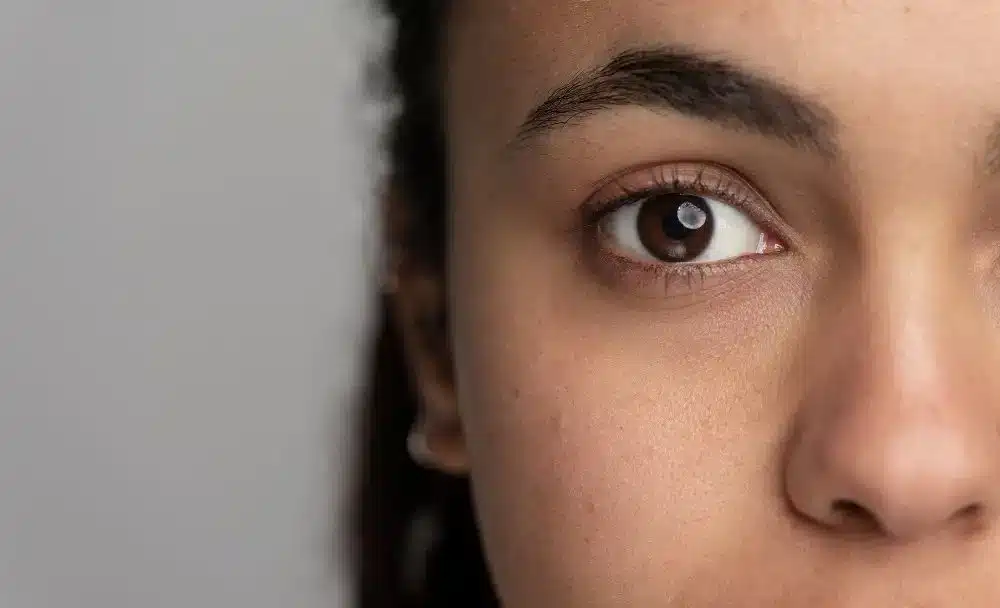
A corneal ulcer is known as Savrana Shukra in Ayurveda and is characterised by corneal oedema, ulceration of the cornea, copious warm discharge, and severe pain (2).
In the Sushruth Samhita, Acharya Sushruth identifies the Krishnagata Mandal (cornea) as the seat of corneal ulcer or Savrana Shukra. This provides a specific focus for Ayurvedic interventions targeting corneal ulcers (3).
Ayurvedic Diagnosis of Corneal Ulcer (3)
The diagnostic process in Ayurveda involves the Ashta Vida Pariksha, which includes the Druk Pariksha. During this examination, the practitioner thoroughly inspects the Sanghis (tissues), Mandals (organs), and Patals (layers) associated with the eyes. By analysing these elements, the Dosha (imbalance) involved, such as Vata, Pitta, or Kapha, can be determined.
Ayurvedic Treatment of Corneal Ulcer (3)
Ayurvedic treatment for corneal ulcers considers various factors such as Bala (strength), Agni (digestive fire), Prakruti (constitution), Desh (environment), Kaal (time), and Vaay (age). This comprehensive evaluation allows for personalised treatment plans.
Samshamana Treatment
Samshamana treatment focuses on balancing the doshas and is primarily administered through Ayurvedic Aushadis (medicines). Depending on the individual’s Dosha imbalance and the severity of the condition, specific medicines are prescribed. Commonly used drugs for corneal ulcers include Pindikanjan, Manhashila Anjan, Amalaki Rasayana, Saptamrit Loha, and Shadhang Gugglu.
Samshodhana Treatment
In cases where the Dosha imbalance is severe, Samshodhana treatment is employed. This involves purification and detoxification procedures known as Kriyakalpa. The specific procedure is determined based on the Dosha imbalance. Samshodhana treatments help in eliminating toxins and restoring balance.
Complications of Corneal Ulcer (4)
If left untreated, corneal ulcers can give rise to various complications, including:
- Corneal scars that can impact vision
- Severe vision loss or blindness
- Development of astigmatism
- Increased risk of cataracts or glaucoma
In rare cases, there is also a possibility of losing the affected eye if the infection spreads.
Prevention Tips for Corneal Ulcer (4)
- Wash your hands thoroughly before touching your eyes.
- Properly clean and disinfect your contact lenses before and after use.
- Avoid sleeping with your contact lenses in; remove them every night.
- Refrain from swimming or showering while wearing contacts.
- Purchase contacts from reputable medical sources.
- Do not wear contacts if your eyes are irritated.
- Regularly clean and sterilise your contact lens case using appropriate solutions.
- Use protective eyewear when engaging in activities or work that may pose a risk of eye injury.
The Takeaway
Corneal ulcers, characterised by open sores on the cornea, can lead to severe complications if left untreated. Prompt diagnosis and appropriate treatment are crucial in managing this condition.
While modern medicine offers medication and surgical options, Ayurveda also provides a holistic approach considering individual factors and employing Sanshaman and Sanshodhan treatments. By balancing Doshas and using personalised Ayurvedic medicines, corneal ulcers can be effectively addressed.
FAQs
- Is a corneal ulcer a medical emergency?
Yes, a corneal ulcer is considered a medical emergency as it can cause permanent vision loss and severe damage to the eye. If you experience symptoms of a corneal ulcer, it is important to seek immediate care.
- How long does it take for a corneal ulcer to heal?
Most corneal ulcers typically heal within two to three weeks with appropriate treatment.
- What are the complications of a corneal transplant?
A corneal transplant may lead to complications like rejection of the donor tissue, eye infection, corneal swelling, and the development of glaucoma or cataracts. Close monitoring and follow-up care are therefore essential in case of a corneal transplant.
Disclaimer: The information provided here is for general information and not meant to substitute any medical advice. Please consult your doctor for appropriate medical consultation.
References
- https://www.aao.org/eye-health/diseases/corneal-ulcer
- https://www.researchgate.net/publication/324828780_Clinical_aspects_of_diseases_of_cornea_in_Ayurveda_Clinical_Aspect_of_Diseases_of_Cornea_in_Ayurveda
- https://ijcrt.org/papers/IJCRT2110274.pdf
- https://my.clevelandclinic.org/health/diseases/22524-corneal-ulcer




